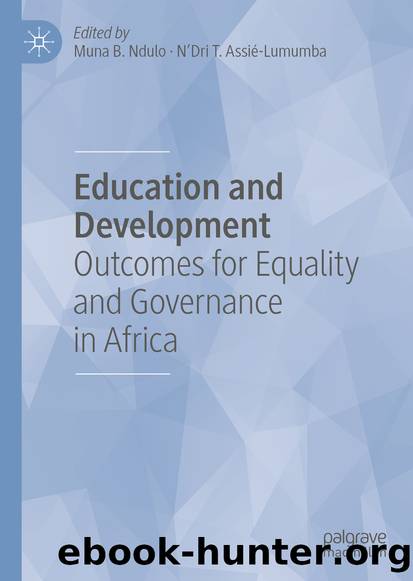Education and Development by Unknown

Author:Unknown
Language: eng
Format: epub
ISBN: 9783030405663
Publisher: Springer International Publishing
Methodology
From an anthropological perspective, I am interested in how education takes place in different cultural contexts and how social, economic, political, and historical situations affect the process of learning. This chapter is part of my broader study in an ethnographic research project conducted in Kenya. Beginning in December 2013, I started a pilot study on education and elite formation among marginalized groups in Kenya, specifically, the Maasai ethnic group of Narok County. The ethnographic research involved mostly participant observation in the Maasai villages and schools and informal interviews with parents, children, teachers, community leaders, and community activists. I went back in the summer of 2017, and conducted 25 more formal interviews with the Maasai among the emerging educational elites from both underprivileged and privileged neighborhoods. I have also done archival research in databases to review countries’ educational statistics and other information about Maasai girls and their contexts. My interviews with educational elites led me to some of the villages where most Maasai children grow up. This chapter is based on children’s experiences in these rural areas. Most importantly, the socioeconomic aspects of different households and their influence on students’ access to schooling became apparent. Further, the gender dynamic, where girls faced greater challenges in gaining access to schooling, drew my attention.
As part of this broader research, I am interested in gender equity and schooling. I want to unravel why and how, currently and historically, women have been left behind in education. Preliminary findings indicate that social and political institutions have historically shaped and preselected elite paths for Maasai girls, which reflect economic inequality among different households and neighborhoods, even within these marginalized and geographically isolated groups. While the conventional knowledge that most Maasai girls are not educated holds some truth, especially in aggregated statistical comparisons with other ethnic groups in Kenya, there are girls from privileged backgrounds who have had a long history of access to schooling and have added to the human capital needed in the country by taking prestigious jobs, such as university professors, medical doctors, and political leaders. Encountering this experience of elite women led me to the question: What are the educational experiences of other girls in marginalized, isolated, and underserved geographic locations in the Maasai community? How do they vary by households? What are girls’ educational needs? My findings indicate that the majority of other Maasai girls in rural areas continue to experience hardship in gaining access to education.
Download
This site does not store any files on its server. We only index and link to content provided by other sites. Please contact the content providers to delete copyright contents if any and email us, we'll remove relevant links or contents immediately.
Kathy Andrews Collection by Kathy Andrews(10520)
The remains of the day by Kazuo Ishiguro(7551)
Spare by Prince Harry The Duke of Sussex(4198)
Paper Towns by Green John(4169)
The Body: A Guide for Occupants by Bill Bryson(3802)
Be in a Treehouse by Pete Nelson(3213)
Harry Potter and the Goblet Of Fire by J.K. Rowling(3046)
Goodbye Paradise(2964)
Never by Ken Follett(2881)
Into Thin Air by Jon Krakauer(2701)
The Remains of the Day by Kazuo Ishiguro(2619)
The Genius of Japanese Carpentry by Azby Brown(2609)
The Cellar by Natasha Preston(2595)
Drawing Shortcuts: Developing Quick Drawing Skills Using Today's Technology by Leggitt Jim(2532)
120 Days of Sodom by Marquis de Sade(2438)
Architecture 101 by Nicole Bridge(2350)
The Man Who Died Twice by Richard Osman(2300)
Machine Learning at Scale with H2O by Gregory Keys | David Whiting(2292)
Fairy Tale by Stephen King(2070)
